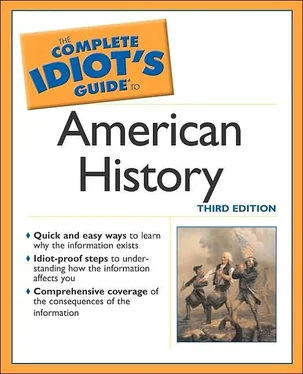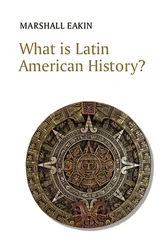Give me your tired, your poor,
Your huddled masses yearning to breathe free,
The wretched refuse of your teeming shore,
Send these, the homeless, tempest-tost, to me,
I lift my lamp beside the golden door!
In 1892, the United States Immigration Bureau opened a major central facility for handling the flood of immigration. Ellis Island, within sight of the Statue of Liberty in New York Harbor, was a place where immigrants could be examined for disease, evaluated as fit or unfit for entry, and either admitted to the mainland, quarantined, or deported. During the 62 years of its operation, from 1892 to 1943, Ellis Island processed immigrants at rates as high as a million people a year.
On May 3, 1886, laborers scuffled with police at the McCormick Reaper Company in Chicago after the company had hired nonunion workers during a strike. In the course of the melee, a laborer was killed, and the strikers—among them avowed anarchists—accused the police of brutality. A protest rally was called at the city’s Haymarket Square the next day, May 4. A contingent of 180 police marched in to disperse the rally, and a bomb exploded in their ranks, wounding 66 officers, seven fatally. A riot broke out, and the police fired into the crowd, killing four persons and wounding at least 200.
Travesty followed tragedy, when eight anarchist leaders were convicted as accessories to murder-despite the fact that the actual bomber was never identified. Four of the anarchists were hanged, one committed suicide, and three were jailed. In an act of great moral heroism that destroyed his political career, Illinois Governor John Peter Altgeld (1847-1902) pardoned the three survivors in 1893.
A political machine –a group, usually dominated by a political party, that dictates the political life of a city. At the “controls” of the “machine” is the boss, who or may not be an elected official.
Muckraker was a reference to Pilgrim’s Progress, a Christian allegorical novel by the 17th-century British writer John Bunyan. One of Bunyan’s allegorical characters, used a “muckrake” to clean up the (moral) filth around him, even as he remained oblivious of the celestial beauty above.
Theodore Roosevelt feared that Republican party bosses had consigned him to a secondary political role when he was nominated as William McKinley’s running mate in the 1900 presidential election. However, Roosevelt became the nation’s 26th president on September 14, 1901, after McKinley died of a gunshot wound inflicted on September 6 by an anarchist named Leon Czolgosz. Roosevelt proved so dynamic a leader that he was elected to the office in his own right in 1904, serving until 1909. Roosevelt had been born into a moneyed old New York family on October 27, 1858. Weak and asthmatic as a child, Roosevelt was determined to build up his body and engaged in a regimen of exercise, sport, and outdoor activity he proudly dubbed “the strenuous life.” He was, by turns and sometimes simultaneously, an author, politician, and rancher. Appointed assistant secretary of the navy under McKinley in 1897, he advocated preparation for war with Spain over its colonial policies in Cuba. With the outbreak of the Spanish-American War the following year, Roosevelt helped organize a volunteer cavalry unit called the Rough Riders, serving in Cuba as its dashing colonel.
His war record and reform reputation propelled Roosevelt to election as governor of New York in 1898. His crusading soon cramped the style of Republican party boss Thomas Collier Platt, who decided to “kick him upstairs” by arranging for his nomination as McKinley’s vice-presidential running mate in 1900.
If the nation mourned McKinley’s assassination the following year, none did so more than Republican conservatives, who had little stomach for Roosevelt’s “Progressivism.” The new president took aim at the big corporate trusts, wielding the Sherman Anti-Trust Act of 1890 as a club.
With election to a second term, Roosevelt became even more zealous in his Progressive reforms, doing battle against what he called the “malefactors of wealth.” He strengthened the Interstate Commerce Commission’s power to regulate railroads, and he supported the Meat Inspection and the Pure Food and Drug bills. In foreign policy, Roosevelt was equally vigorous and (as many saw it) radical. In 1903, when Colombia rejected a treaty giving the United States the right to dig a canal across the isthmus of Panama, “TR” supported the revolution that created an independent Panama. He then struck a canal treaty with the new nation and supervised construction of the Panama Canal.
For better or worse, Roosevelt was an American imperialist, who advocated extending the nation’s sphere of influence—by force, if necessary. “Speak softly and carry a big stick,” Roosevelt remarked in a September 2, 1901, speech at the Minnesota State Fair. Criticized by some contemporaries and historians alike as a war monger, Roosevelt stepped between Russia and Japan in 1905 to mediate peace in the Russo-Japanese War, an action that earned him the Nobel Peace Prize.
After he left office in 1909, Roosevelt embarked on various adventures (including African big game hunting), then helped Robert M. La Follette found the Progressive Party—popularly called the Bull Moose Party. As third-party candidate, Roosevelt outpolled Republican William Howard Taft in the 1912 elections, but he lost to Democrat Woodrow Wilson. Falling ill in 1918, TR died on January 6, 1919.
Populism is a political philosophy that supports the rights and power of the people versus the privileged moneyed elite. It was the philosophy of the Populist Party that polled more than a million votes in the presidential election of 1892.
In This Chapter
Jingoism, imperialism, and “yellow journalism”
The Spanish-American War
The Wilson administration and entry into World War I
In his Farewell Address of 1797, George Washington cautioned his fellow Americans to avoid “foreign entanglements”; for a century thereafter, the nation did just that. The United States, insulated from the European and Eastern powers by great oceans, maintained a foreign policy of strict isolation. The one chink in this isolationist armor was Central and South America. President James Monroe promulgated his Monroe Doctrine in 1823, essentially declaring the entire Western Hemisphere off-limits to European powers with designs on creating new colonies. In the course of the 19th century, the United States became the de facto major power of the hemisphere. During the century, too, while other nations amassed far-flung empires throughout the world, the United States expanded exclusively across its vast continent.
By the end of the century, the nation extended from “sea to shining sea,” and a significant number of Americans (some called them “patriots,” others “imperialists,” and still others “jingoists”) started thinking that it should extend even farther. Not content with the United States as a force in this hemisphere, these individuals wanted to see it on an equal footing with the great European powers of the world.
Strange as it may seem, the birth of U.S. imperialism was related to a newspaper comic. In 1895, Richard Felton Outcault, a cartoonist for the New York World, introduced a singlepanel comic that featured as its main character a slum child costumed in a garment that was tinted yellow by a brand-new color process, of which the paper was very proud. The World’s publisher, Joseph Pulitzer (1847-1911), was delighted with “The Yellow Kid of Hogan’s Alley,” the popularity of which allowed him to close the gap in his circulation race with The New York Journal, published by rival news magnate William Randolph Hearst (1863-1951). Not to be outdone, Hearst lured Outcault to the ranks of the Journal, whereupon Pulitzer hired George Luks (who would go on to become a major American painter) to continue the original comic as simply “The Yellow Kid.”
Читать дальше












